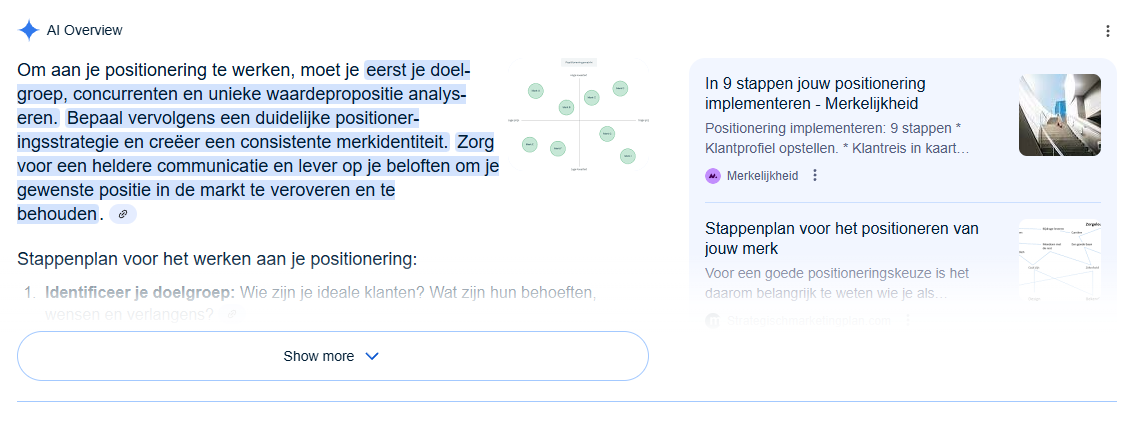B2B entrepreneur, what does AI really mean for your SEO?
We are now regularly asked by our clients; what about AI and SEO? Everyone is shouting and speculating about the impact of Artificial Intelligence (AI) on online marketing, especially SEO. One guru claims SEO is dead, while another bombards us with new, trendy acronyms and tactics. For you as a B2B entrepreneur, with a website crucial to your success, this landscape can be confusing and even intimidating. Should you change everything now? Invest in expensive, unproven AI tools? Or wait and see?
The answer, as is often the case, is not that simple. No one has a crystal ball, and experts disagree. That’s why I have compared several expert articles. We highlight the differences and similarities and draw six concrete, useful conclusions. So you don’t get swept up in the hype but continue to make strategic choices.
Four Perspectives
To understand the discussion, we first need to listen to what the experts and data tell us.
Google is Still King (GSQI)
We start with a healthy dose of realism. The article from GSQI warns about the massive media hype around AI search traffic. While some believe AI already accounts for a huge portion of web traffic, data from Google Analytics shows a different picture: for most websites, traffic coming directly from AI search engines is currently less than 1%. The undisputed king of website traffic remains, by an overwhelming majority, traditional Google Search. The conclusion is clear: it is dangerous and premature to throw overboard your proven SEO strategy focused on Google for unproven AI optimization tactics.
SEO Foundation Remains Crucial (Ziptie)
But what if AI answers, like Google’s ‘AI Overviews,’ become the standard? Does that mean the end of clicks to your website? The article from Ziptie provides the answer. Their analysis of thousands of queries shows that AI search engines, including Google’s, rely on traditional search results. A number 1 position on Google gives you a 25% chance of being used as a source in an AI answer. The top results thus form the basis for the information the AI synthesizes. In other words: your traditional, strong positions on Google are your ticket to even play a role in the world of AI search. The fundamentals of SEO – authority, quality, and relevance – are more important than ever.
SEO Now Means Search Everywhere Optimization (SparkToro)
SEO veteran Rand Fishkin (SparkToro) proposes a conceptual but important change. He suggests we stop inventing new acronyms and simply broaden the definition of SEO to “Search Everywhere Optimization.” Your potential B2B customer is not only searching on Google. They look for solutions on LinkedIn, ask questions on platforms like Reddit, and watch videos on YouTube. The skills of an SEO specialist – understanding search intent, optimizing content, and building authority – naturally apply to all these platforms. The focus shifts from ‘search engine’ to the ‘searching human,’ wherever they may be.
Even the Largest SEO Companies Are Uncertain About Strategy (Detailed)
How do large, publicly traded companies like Booking.com and NewsCorp respond to these developments? The website Detailed.com collected quotes from dozens of CEOs and executives. What stands out is that they don’t agree. Everyone says something different. Some companies (like Chegg) see a direct negative impact of AI Overviews on their traffic. While others see opportunities in the broader distribution of traffic sources or report, like Cars.com, strong growth thanks to investments in editorial content. This mainly shows the great uncertainty in the market. Even giants with huge budgets are still figuring out the best strategy.

Differences and Similarities
Where the articles clash is mainly in urgency and focus. The GSQI article hits the brakes and says you should focus on what works now (Google), while SparkToro looks further ahead and says we should broaden our view. Fortunately, these do not necessarily exclude each other.
And the underlying message is remarkably unanimous. None of the articles claim that the old principles of marketing and SEO have become worthless. Quite the opposite. The necessity for quality, authority, and a deep understanding of what the customer is looking for (intent) is emphasized by everyone. Whether you want to rank in the traditional top 10 to also appear in AI Search or be found on a niche forum, it all starts with delivering the best, most reliable information in a way that crawlers and bots can properly index.
Everyone agrees that SEO is not dead but is maturing. It is becoming less of a technical toolbox and more a fundamental aspect of marketing focused on providing the best answer to a customer’s question, on any platform.
Conclusions for the B2B Entrepreneur
And what does this concretely mean for you and your website? What should you do? We draw six conclusions:
- Don’t get carried away by the hype. Base your decisions on your own data. Dive into your results and see where your traffic really comes from. Chances are Google is still your main source. Keep following AI developments but don’t change course recklessly.
- Keep strengthening your SEO foundation. Traditional rankings are also your ticket for AI search. So you should keep investing in that. That means: ensure a technically flawless website, build your authority, and create content of the highest quality.
- Answers, not keywords. The way people (and AIs) search is shifting from isolated keywords to actual questions. Optimize your content not for keywords but for the real questions of your target audience. Structure your articles with clear headings and provide direct, concise answers. This serves both the ‘featured snippets’ in traditional search results and the summaries of AI.
- Human input remains essential. Who knows what questions your customer is concerned with? And where does your ideal B2B customer look for information? Your account managers, service department, and all other people who have customer contact can probably tell you this. Involve them in your search and focus on the most important questions and platforms.
- Brand value more important than ever. AI can generate an abundance of content, but how does your potential customer know what to read or believe? This makes a strong and trusted brand even more valuable. It is a signal of authority and reliability, which helps not only people but also AI systems to make choices. A strong brand is therefore a huge competitive advantage in online marketing as well.
- Don’t be blind to the risks. Dependence on a single channel, like Google, is of course a risk. Besides SEO, consciously invest in building other channels, such as a good email list and strong visibility on social media. You want to have contact with your potential customers at as many moments as possible during the customer journey. And that means you can definitely experiment with new platforms and tools.
The world of search is changing, that is certain. And search is only becoming more important for B2B companies. But the core principles of good marketing remain. Quality, authority, and a true understanding of your customer are not devalued by AI; they may even become more important. As a B2B entrepreneur, you must keep focusing on this, and if new tools come along that make it easier, that’s a bonus.
Curious how we at Merkelijkheid use AI or how we collaborate with B2B entrepreneurs to ensure we stay on top of your potential customer’s needs? We’d love to tell you all about it, preferably with examples of clients for whom we have been achieving success for years.
